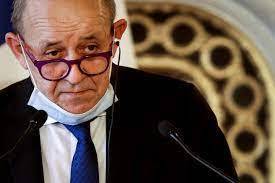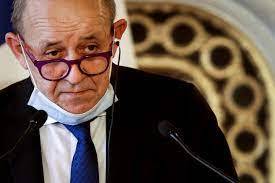French Foreign Minister Jean-Yves Le Drian revealed on Monday that world powers and Iran are likely to meet on the sidelines of this week's annual gathering of world leaders at the United Nations General Assembly. During a press conference, Le Drian stated that the meeting, which will include all parties to the 2015 Iran nuclear deal except the United States, which withdrew, aims to build "positive momentum" to resume negotiations that halted in June.
Later, European Union foreign policy chief Josep Borrell denied Le Drian's claims to reporters, confirming that ministers from Britain, China, France, Germany, and Russia would not hold a meeting with Iran during the UN General Assembly this week. Le Drian emphasized that "time is running out" for reaching an agreement on reviving the Iran nuclear deal and urged Iran to appoint representatives for nuclear talks with world powers as soon as possible.
The Joint Comprehensive Plan of Action is the formal name of the agreement reached in 2015 in Vienna among major powers (the United States, China, Russia, Britain, France, and Germany) with Iran regarding Tehran's nuclear program before the U.S. withdrew under former President Donald Trump. The French minister noted that since the election of Iranian President Ebrahim Raisi in June, "negotiations have not resumed at Iran's request."
Le Drian stressed the "importance of attempting to launch a positive dynamic this week to resume talks in Vienna regarding the return of Iran and the United States to the Joint Comprehensive Plan of Action." He asserted that what matters is to "resume negotiations" so that the U.S. rejoins the agreement and Iran returns to strict compliance with it.
Diplomats reported that the foreign ministers of the concerned countries intend in principle to hold a meeting in New York on Wednesday afternoon, but "this has not yet been confirmed." Newly appointed Iranian Foreign Minister Hossein Amir Abdollahian will participate in the UN General Assembly meetings in New York this week. Abdollahian is scheduled to hold bilateral meetings with his German, Chinese, French, British, and Russian counterparts, representatives of the five remaining parties to the Iranian nuclear deal, but there is no expected meeting between him and U.S. Secretary of State Antony Blinken.
In April, indirect talks began in Vienna between the United States and Iran mediated by the other parties to the agreement. However, discussions have stalled since the election of the hardliner Raisi as Iran's president. In 2018, the then U.S. President Trump withdrew the country from the agreement and re-imposed sanctions on Tehran that had been lifted. In response to Trump's decision, Iran gradually freed itself from the commitments outlined in the deal. The new Democratic president, Joe Biden, expressed a willingness to return to the agreement if the Islamic Republic commits to it.
### Paris to Host International Conference on Libya
Regarding the Libyan issue, Le Drian announced that France would host an international conference on Libya in November as preparations continue for the elections scheduled at the end of December. He explained that the conference, which Germany and Italy are helping to prepare, will be held on November 12 with the goal of ensuring the election timetable is enacted and addressing the departure of foreign fighters from Libya.
This announcement comes amid increasing talk of attempts by some political parties to obstruct the elections and postpone them to a later date, with the Libyan High Council of State, controlled by the Brotherhood, calling on Monday for a one-year delay of the presidential elections until after a constitutional referendum, claiming that conducting elections as scheduled would not bring stability to the country.
On the issue of submarines and the U.S.-British-Australian alliance, the French foreign minister criticized the "disregard" shown by the United States to France concerning the French submarine deal with Australia, pointing to "reactions that belong to a time we hoped had ended." He stated that "the issue primarily concerns the collapse of trust among allies," which "requires Europeans to think carefully" about their alliances. He added that "alliances mean transparency" and "the ability to foresee," as well as "clarity" and "talking to one another," and "not hiding," all of which need clarification today.
Last Saturday, France accused Australia and the United States of "lying and duplicity" and deemed Britain "opportunistic" following Canberra's cancellation of a massive contract with Paris for submarines, considering the situation a "serious crisis" among allies. French President Macron ordered the recall of France's ambassadors to Canberra and Washington, an unprecedented move to express his anger over Australia's decision to cancel a significant submarine deal with France and replace it with American submarines, coinciding with the announcement of a U.S.-British-Australian alliance in the Pacific aimed partly at countering China. This dispute undermines hopes of improving relations between Paris and Washington during President Joe Biden's term.




